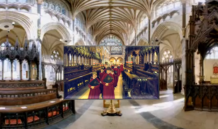Articles

The EU-funded VISTA AR project is using new technologies to help Exeter Cathedral 'retell its story to the next generation'
Choir recitals to make virtual return to Exeter Cathedral in cross-Channel collaboration
Virtual reality devices at heritage sites in France and the UK have been adapted so tourists can ‘visit’ an attraction in lockdown – and in the case of Exeter Cathedral even listen to the choir sing.
The VISTA AR project, led by the University of Exeter Business School and part of the EU’s Interreg France (Channel) England programme, has worked closely with Exeter Cathedral, Château de Fougères in Brittany and others to develop digital devices that create new kinds of visitor experiences using augmented and virtual reality.
These include tablet-based audio-visual tours, VR headsets allowing visitors to meet characters from the past, and an augmented reality app that can be pointed at an artefact or landscape to reveal what it looked like hundreds of years ago.
Now, as the global pandemic has forced heritage sites to shut their doors or rethink how they operate, the VISTA team has launched new online teaser versions of their AR and VR devices to allow people to enjoy them from home.
VISTA has joined forces with Exeter Cathedral to provide a 360 degree video of a choir recital that will be launched this Friday, in a taster of a new project where Cathedral visitors get to experience an immersive choral performance via VR headset.
It follows the launch of another collaboration with the Cathedral in which visitors have the opportunity to explore online the ancient books and manuscripts within the Cathedral’s collection.
The digitised texts include the Exon Domesday, the only surviving regional draft of William the Conqueror’s great Domesday Book of 1086, and The Exeter Book of Anglo-Saxon Poetry, the oldest book of English poetry in the world.
This online experience has been launched ahead of a project to develop and install digital touchscreens in the Cathedral that will give visitors access to books, artefacts and other historical treasures.
Professor Andi Smart, the VISTA AR Project Lead and Professor of Operations and Process Management at the University of Exeter Business School, said: “These experiences were produced to give potential visitors a glimpse of the experiences that will be deployed on site over the summer.
Many sites have been promoting online content throughout the pandemic and it is true that for some visitors, an element of ‘online fatigue’ is creeping in. But we hope that these experiences will help to encourage people to try out the onsite experience for real.”
For The Very Revd Jonathan Greener, the Dean of Exeter, the new experiences represent a new chapter in Exeter Cathedral’s story:
“It’s been nearly a thousand years since the foundation of Exeter Cathedral, so we love to tell visitors about our history. But this is very much a living and evolving Cathedral, so we’re equally enthusiastic about our present and future. That’s why we're excited to be part of the VISTA AR project.
“It’s about applying new technologies to retell our story to the next generation – whether they’re visiting here in the building or discovering us online. And because some of these experiences are now online, we get to share something of the wonder of Exeter Cathedral and its treasures with a much wider audience.”
VISTA is also set to unveil online ‘teasers’ of its other projects with heritage sites across the UK and France.
An AR app for the Botallack tin mine in Cornwall that allows visitors to view the mines through history will be previewed through an interactive Google street view of the reconstructed mining landscape.
And ahead of launching an AR app for the South West Coast Path, the longest waymarked long-distance footpath in England, VISTA will launch another 360° Google street view of the birdscape with information about six bird species.
In France, VISTA has also been working with the Château de Fougères in Brittany to develop AR and VR devices that give visitors an experience of castle life back in medieval times, and will be releasing a promotional video showing the devices in action.
And potential visitors to the Musée sous-marin (Lorient Submarine Museum) in Brittany will soon have the chance to go into the heart of the ocean with the submariners of last century with a 360° YouTube immersive teaser video produced by VISTA.

Date: 25 May 2021
